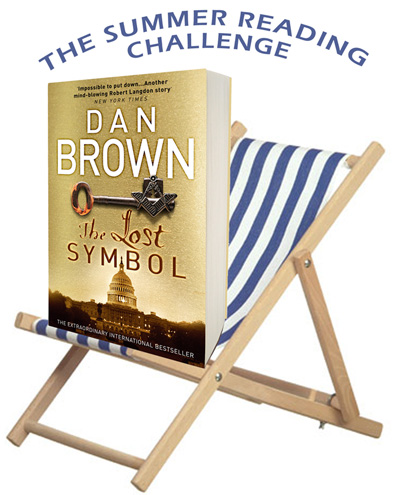 My fourth and final choice for the Transworld Summer Reading Challenge, e Squared is the book I’m giving a second chance. I tried reading it last year, but didn’t find it particularly amusing, and so gave up. When I saw it on the list for the Transworld Challenge, though, I thought it might be interesting to give it another go. I’m glad I did, because this time, I found the novel hilarious.
My fourth and final choice for the Transworld Summer Reading Challenge, e Squared is the book I’m giving a second chance. I tried reading it last year, but didn’t find it particularly amusing, and so gave up. When I saw it on the list for the Transworld Challenge, though, I thought it might be interesting to give it another go. I’m glad I did, because this time, I found the novel hilarious.
e Squared is a follow-up to Matt Beaumont’s debut novel e, and its short sequel The e Before Christmas (both published 2000). It concerns a London advertising agency (sorry, I mean “thought collective”) called Meerkat360, and is told entirely through emails, instant-message and SMS conversations, and blog posts. I haven’t read either of the two earlier books, but, although I inevitably missed some of the context, it didn’t matter too much – enough time has passed in fictional terms for e Squared to pretty much stand alone.
Since so much of the fun of reading Beaumont’s novel lies in discovering the absurdities of its characters and situations, I won’t reveal too much here. But the cast of e Squared includes: David Crutton, the CEO of Meerkat360, whose relationship with his wife Janice becomes so strained at times that they resort to communicating with each other via their PAs; Liam O’Keefe, whose debts are so large that he’ll filch anything he can from the office and sell it on eBay; the hopelessly naive Harvey Harvey, who doesn’t understand the concept of spam email, and is deeply concerned about all the lonely girls who keep emailing him; and Caroline Zitter, who’s forever out of the office at some outlandish seminar or other. I’m holding back a little in my descriptions, there; the absurdities of these (and other) characters are turned right up to the maximum.
The events of e Squared are also gloriously daft. The Creative Department of Meerkat360 employs various staff to enhance their creativity, including a hairdresser and clown (much to the consternation of David Crutton). Some of the agency’s commissions are rather dubious (e.g. cigarettes with added vitamins and minerals – “your 5 a day”). A former creative director of Miller Shanks (the forerunner to Meerkat360) has retired to France, from where he chronicles his life in blog posts that nobody reads. Transworld Publishers make a cameo appearance, and are shown to have some of the same emailing habits as Meerkat360 (though surely it’s not like that in real life…).
What really adds an extra dimension to e Squared for me is the way that Beaumont uses the epistolary form for effect. For example, the first chapter intercuts Janice Crutton’s annual Christmas email to her family and friends – which paints life in the Crutton household as a model of familial happiness and harmony – with other emails and exchanges which suggest a rather different reality. And there are times when the distancing effect of having events reported to us in emails, rather than “witnessing” them directly, gives the humour a deadpan quality.
But, you know, e Squared is a whole lot funnier to read than it is to describe like this. So I shall stop there and just suggest that you go and read it.
Elsewhere
Some other reviews of e Squared: Rather Lovely; For Books’ Sake; Bookmunch; Den of Geek.
Matt Beaumont’s website
Meerkat360 website
Den of Geek interview with Beaumont
 On to my third choice for the
On to my third choice for the  Prep is my second choice in the
Prep is my second choice in the  This is the first book I’ve read for the
This is the first book I’ve read for the 
Recent Comments